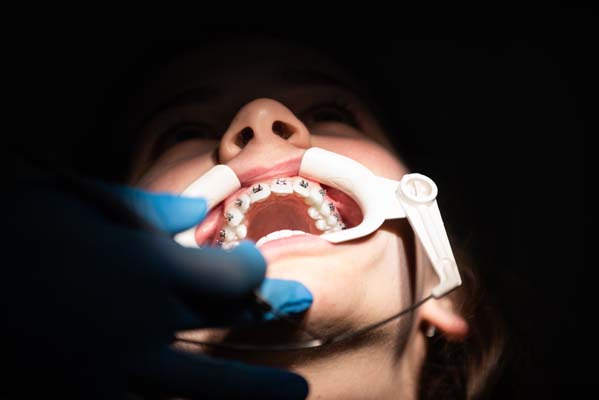Are There Any Foods I Should Avoid After a Deep Teeth Cleaning?

Deep teeth cleaning can reverse gingivitis and help bring periodontitis under control. It includes scraping tartar and plaque off teeth surfaces and their roots. The dentist also polishes the patient’s teeth roots, so it is harder for tartar to build up on them. Teeth roots being polished makes it easier for gum tissues to be attached to them.
Local anesthetics are administered during deep teeth cleaning treatments, so the patient does not experience pain as the dentist works. The treatment is often broken down into multiple treatments to minimize discomfort and to avoid having to numb the patient’s entire mouth.
Foods that should be avoided after deep teeth cleaning treatments
It is perfectly normal for patients to experience tender gums and soreness after deep cleaning treatments. Some patients also experience increased teeth sensitivity afterward. These side effects should go away within a few days, and they can be managed with over-the-counter painkillers.
Eating certain foods can irritate a patient’s tender gums and lead to increased discomfort. It can also slow down the healing process. Foods patients that who have just completed deep cleanings should avoid include the following:
Foods that might get stuck in gum tissues: Foods that have small bits that can get stuck inside a person’s gum tissues should be avoided after root scaling and planing. Examples of such foods include nuts, popcorn, chocolate, and dried fruits. Getting food particles in the gums leads to irritation, which increases the discomfort experienced by the patient.
Acidic foods: These types of foods can be harsh on gums that have already been tenderized by deep cleaning. Foods like pickles, tomatoes, and citrus fruits are highly acidic, and so are beverages like red wine and fruit juices.
Avoid foods that require large bites: Patients should avoid any foods that force them to open their mouths fully to get a bite. Such foods put a great deal of stress on the jaw, and they require more force to chew. It is better not to overstress tender teeth and gum tissues that are recovering from root scaling and planing.
Stay away from spicy foods: These foods can be tough to handle even when gum tissues are not irritated. Trying to consume spicy foods while gum tissues are recovering from deep cleaning can lead to significant pain and discomfort. It can also lengthen the recovery period.
Foods that are safe to eat
Dentists recommend restricting your diet to bland foods that are easy to chew and swallow for the first few days after root scaling and planing. Foods like pasta, mashed potatoes, and eggs should not aggravate tender gum tissues. Acidic beverages like citrus juices should be switched out with water or milk during this time.
Deep cleaning protects your teeth against tooth decay and gum disease
Removing plaque and tartar deposits from teeth surfaces can help protect your teeth from two common oral issues. Give us a call or visit our Houston clinic to set up an appointment with our dentist.
Request an appointment here: https://www.lastingimpressionsdentalgroup.com or call Lasting Impressions Dental Group at (832) 784-8212 for an appointment in our Houston office.
Check out what others are saying about our services on Yelp: Deep Teeth Cleaning in Houston, TX.
Recent Posts
When it comes to oral health care for children and teenagers, choosing a kid friendly dentist is a great idea. Although other dentists can cater to children and adults alike, a kid friendly dentist usually has specialized training and tools to handle children, as well as an office environment designed to put kids at ease.…
Fastbraces® are the quickest way to improve the alignment of crooked teeth. These devices often negate the need for extractions and they can safely straighten teeth in as little as three months. This article will explore how fastbraces® work and some of the important things to know when thinking about going this route.Fastbraces® share some…
Sedation dentistry is a common option for various levels of dental treatment in today's age. It can help with something as simple as teeth cleaning to something more serious, like a tooth extraction. Regardless for the reason, people are curious about sedation dentistry and have several questions.1. Sedation dentistry can ease anxietySedation dentistry is the…
Implant supported dentures are becoming a popular tooth replacement option. They are known to replace entire arches of teeth, whether it be the top or bottom. However, because tooth replacement can be complex, many individuals are curious as to how successful the process is for upper teeth. Continue reading to find out! Below is a quick…


